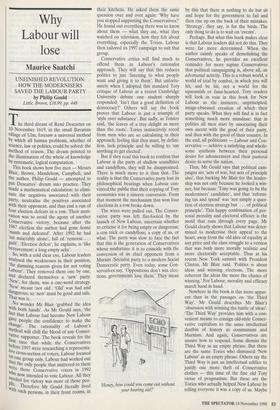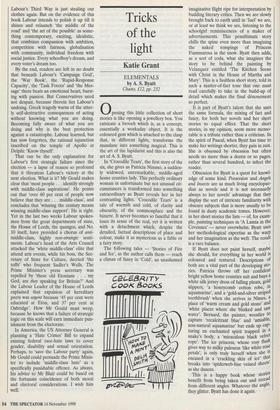Why Labour will lose
Maurice Saatchi
UNFINISHED REVOLUTION: HOW THE MODERNISERS SAVED THE LABOUR PARTY by Philip Gould Little, Brown, £16.99, pp. 448 The third dream of Rene Descartes on 10 November 1619, in the small Bavarian village of Ulm, foresaw a universal method by which all human problems, whether of science, law or politics, could be solved: the method of reason. The dream pointed to the illumination of the whole of knowledge by systematic, logical computation. This book shows how five men — Messrs Blair, Brown, Mandelson, Campbell, and the author, Philip Gould — attempted to put Descartes' dream into practice. They made a mathematical calculation: to elimi- nate the negatives associated with their party, neutralise the positives associated with their opponent, and thus end a run of four election defeats in a row. Their moti- vation was to avoid the agony of another Conservative victory, because after the 1987 election the author had gone home numb and defeated'. After 1992 he had sat miserably alone', full of 'remorse . . . guilt'. 'Election defeat', he explains, is 'like bereavement: a long empty ache'. So, with a cold clear eye, Labour leaders analysed the weaknesses in their position, the damning reasons given for not voting Labour'. They removed them one by one, and declared themselves a 'new' party. Mew', for them, was a one-word strategy. New' meant 'not old'. 'Old' was bad and dangerous, so 'new' must be good and safe. That was it. No wonder Mr Blair 'grabbed the idea with both hands'. As Mr Gould says, 'the fact that Labour had become New Labour gave people the confidence to make the enange ' . The rationality of Labour's Method will chill the blood of any Conser- vative supporter. The book reveals for the before time that while the Conservatives .c.efore 1997 were researching a representa- uve cross-section of voters, Labour focused ?n One group only. Labour had worked out that the only people that mattered to them were those Conservative voters in 1992 :h° now intended to vote Labour. All they n eded for victory was more of those peo- Piee ry Therefore Mr Gould literally lived with such persons, in their front rooms, in their kitchens. He asked them the same question over and over again: 'Why have you stopped supporting the Conservatives?' He found out everything there was to know about them — what they ate, what they watched on television, how they felt about everything, especially the Tories. Labour then tailored its 1997 campaign to suit that group.
Conservative critics will find much to offend them in Labour's rationalist approach. They will say that this reduces politics to just 'listening to what people want and giving it to them'. But unfortu- nately when I adopted this standard Tory critique of Labour at a recent Cambridge University debate one student sharply responded: 'Isn't that a good definition of democracy?' Others will say the book proves that Labour is just a triumph of `style over substance'. But sadly, as Tolstoy said, 'the leaves of a tree delight us more than the roots'. Tories instinctively recoil from men who are so calculating in their approach, feeling that they must, by defini- tion, lack principle and be willing to 'say anything to get elected'.
But if they read this book to confirm that Labour is the party of shallow soundbites and candyfloss, they will be disappointed. There is much more to it than that. The reality is that the Conservative party lost its philosophical bearings when Labour con- vinced the public that their copying of Tory economics was a sincere conversion. From that moment the mechanism that won four elections in a row broke down.
The wires were pulled out. The Conser- vative party was left flat-footed by the launch of New Labour, uncertain whether to criticise it for being empty or dangerous; a con trick or candyfloss; a copy of us, or what. The party was slow to face the fact that this is the generation of Conservatives whose misfortune it is to coincide with the conversion of its chief opponent from a Marxist /Socialist party to a modern Social Democratic party. Even today, some Con- servatives say, 'Oppositions don't win elec- tions, governments lose them.' They mean `Honey, how could you come out without your hearing aid?' by this that there is nothing to do but sit and hope for the government to fail and then rise up on the back of their mistakes. `Strategy', they say, is for the birds. The only thing to do is to wait on 'events'.
Perhaps. But what this book makes clear is that Labour leaders did not do this. They were far more determined. When the author calmly speaks of demolishing the Conservatives, he provides an excellent reminder for more supine Conservatives that political campaigning is, above all, an adversarial activity. This is a robust world, a world of trial by combat, in which you will hit, and be hit, not a world for the squeamish or faint-hearted. Tory readers will look in vain in this book for New Labour as the insincere, unprincipled, image-obsessed creation of which their party speaks. What they will find is in fact something much more mundane: that in politics all men start by associating their own ascent with the good of their party, and then with the good of their country. In the end, all politicians — Labour and Con- servative — achieve a satisfying and whole- some synthesis between their personal desire for advancement and their pastoral desire to serve the nation.
Thus, Mr Gould says that political cam- paigns are 'acts of war, but acts of principle also', that backing Mr Blair for "the leader- ship was not only because he looked a win- ner, but because 'Tony was going to be the modernisers' candidate', and that 'reform- ing tax and spend' was 'not simply a ques- tion of election strategy but .. . of political principle'. This happy combination of per- sonal morality and electoral efficacy is the motif that runs through every page. Mr Gould clearly shows that Labour was deter- mined to modernise their appeal to the heart, away from the old idea of equality at any price and the class struggle to a version that was both more morally realistic and more electorally acceptable. Thus at his recent New York summit with President Clinton, Mr Blair said, 'Politics is about ideas and winning elections. The more coherent the ideas the more the chance of winning.' For Labour, morality and efficacy march hand in hand.
Nowhere in the book is this more appar- ent than in the passages on 'the Third Way'. Mr Gould describes Mr Blair's `obsession with winning the battle of ideas'. `The Third Way' provides him with a con- venient means to consign old-style Conser- vative capitalism to the same intellectual dustbin of history as communism and Marxism. And again, Conservatives are unsure how to respond. Some dismiss the Third Way as an empty phrase. But these are the same Tories who dismissed 'New Labour' as an empty phrase. Others say the Third Way is just an intellectual edifice to justify one more theft of Conservative clothes — this time of the fine old Tory virtue of pragmatism. But these are the Tories who actually helped New Labour by telling everyone it was a copy of us. Maybe Labour's Third Way is just stealing our clothes again. But on the evidence of this book Labour intends to polish it up till it shines and relaunch 'the middle of the road' and 'the art of the possible' as some- thing contemporary, exciting, idealistic, that combines compassion with ambition, competition with fairness, globalisation with community, individual freedom with social justice. Every schoolboy's dream, and every voter's dream too.
By the end, readers are left in no doubt that beneath Labour's 'Campaign Grid', the War Book', the `Rapid-Response Capacity', the 'Task Forces' and 'the Mes- sage' there beats an emotional heart, burst- ing with passion. But Conservatives need not despair, because therein lies Labour's undoing. Greek tragedy warns of the utter- ly self-destructive consequences of acting without knowing what you are doing. Becoming fully aware of what you are doing and why is the best protection against a catastrophe. Labour learned, but has now forgotten, the rational injunction inscribed on the temple of Apollo at Delphi: 'Know thyself.
That can be the only explanation for Labour's first strategic failure since the election — a lapse of reason so profound that it threatens Labour's victory at the next election. What is it? Mr Gould makes clear that 'most people . . . identify strongly with middle-class aspirations'. He points out that 'over 60 per cent of people now believe that they are . . . middle-class', and concludes that 'winning the century means winning middle-class support'. He is right. Yet in the last two weeks Labour spokes- men from the great departments of state, the House of Lords, the quangos, and No. 10 itself, have provided a chorus of anti- middle-class, highly non-strategic senti- ments. Labour's head of the Arts Council attacked the 'white middle-class' elite that attend arts events, while his boss, the Sec- retary of State for Culture, decried 'the toffs' who frequent Sadler's Wells. The Prime Minister's press secretary was repelled by 'these old Etonians . . . my God, are they speaking for Britain?' And the Labour Leader of the House of Lords explained that expulsion of hereditary peers was urgent because '45 per cent were educated at Eton, and 37 per cent at Oxbridge'. How Mr Gould must weep, because he knows that a failure of strategic logic on this scale will earn immediate pun- ishment from the electorate.
In America, the US Attorney General is planning a 'Hate Crimes' Bill to expand existing federal race-hate laws to cover gender, disability and sexual orientation. Perhaps, to 'save the Labour party' again, Mr Gould could persuade the Prime Minis- ter to include 'middle-class hate' as a specifically punishable offence. As always, his advice to Mr Blair could be based on the fortunate coincidence of both moral and electoral considerations. I wish him well.



















































































 Previous page
Previous page